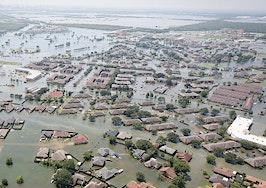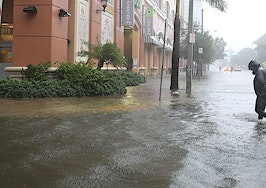Climate change poses significant threats to properties across the U.S., increasing the likelihood of damaging fires and flooding, as numerous scientific studies in recent years have found.
But the real estate industry has been slow to adopt standards to deal with the rising threat, according to a study published this week by the Urban Land Institute, a nonprofit education and research institute and Heitman, a real estate investment firm.
“An increase in the number and intensity of severe weather-related events, such as hurricanes and flooding, has demonstrated more clearly the real risks that climate change presents to real estate,” the study reads. “It is an urgent and complex challenge which must be addressed but for which the industry does not yet have a clear strategy.”
The impacts and perceived risks of climate change are already beginning to be reflected in the residential market, the study explains.
Homes exposed to flood-risk or sea level rise have sold for less than similar properties without flood risk, the study says, citing an academic study.
Commercial real estate properties located in areas vulnerable to climate risks may have a more grim outlook. More than $130 billion of U.S. institutional real estate is in metropolitan areas that rank in the top 10 percent for exposure to sea level rise, according to the study.
Climate change is also putting a strain on the insurance industry, according to the study. In 2017, insurers paid out a record $135 billion globally for damage caused by storms and natural disasters. That figure does not represent actual damages either. The report estimates damages in the United States alone were $307 billion in 2017.
“Beyond damages, climate and weather events can lead to increased insurance, maintenance, and operational costs and, potentially, a decrease in property liquidity, and value,” the study’s key findings appendix says.
“At this early stage, investment managers view insurance as the primary means of financial protection against physical damage from climate events,” the study’s key findings appendix continues.
“However, insurance will not protect against a reduction in demand for assets in locations seen as vulnerable to climate risks.”
The study cites that some efforts to improve the sustainability of buildings has begun, including a focus on improving resource efficiency, occupant health and reducing greenhouse gas emissions. And while these efforts can lower operating costs and make a property more desirable – and thereby boost rental income or improve liquidity – they do not address the location-specific threats posed by rising sea levels.
The authors of the study interviewed real estate investment individuals to find out what the industry is doing to prepare for the threat of climate change and found that while awareness is growing, there’s no standardized response.
The industry, as a whole, needs to play an important role in helping the investment community better understand the risk.
The report makes six recommendations for investment managers:
- Assess physical climate risks at the property and portfolio level.
- Evaluate climate risks in investment decision-making processes.
- Incorporate additional mitigation and adaptation actions for assets at risk.
- Proactively address potential issues with insurance coverage.
- Monitor and address policy and regulatory risk.
- Evaluate market risk and engage with city-level resilience strategies.












